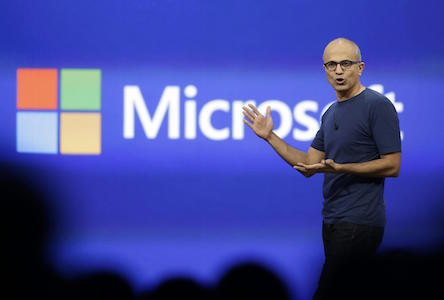Under Satya Nadella, Microsoft is getting stuff done
 I like this new Microsoft. Satya Nadella’s Microsoft. Yes, the CEO needs to improve his public speaking skills, at least when talking to women’s conferences. Yet when you look at the company’s recent activities, what appears are lots of significant moves toward openness, a very positive focus on personal productivity, and even inventiveness.
I like this new Microsoft. Satya Nadella’s Microsoft. Yes, the CEO needs to improve his public speaking skills, at least when talking to women’s conferences. Yet when you look at the company’s recent activities, what appears are lots of significant moves toward openness, a very positive focus on personal productivity, and even inventiveness.
That’s not to say that Microsoft is firing on all cylinders. There is too much focus on Windows as the universal platform, when not every problem needs Windows as a solution. There is too much of a focus on having its own mobile platform, where Windows Phone is spinning its wheels and can’t get traction against platforms that are, quite frankly, better. Innovation is lacking in many of Microsoft’s older enterprise products, from Windows Server to Exchange to Dynamics. And Microsoft isn’t doing itself any favors by pushing Surface Pro and competing against its loyal OEM partners—thereby undermining the foundations of its success.
That said, I like some of Microsoft’s most recent initiatives. While it’s possible that some of them were conceived under former CEO Steve Ballmer, they are helping demonstrate that Microsoft is back in the game.
Some examples of success so far:
- Microsoft Band. Nobody saw this low-cost, high-functionality fitness band coming, and it took the wind out of the Apple Watch and Samsung Gear. The Band is attractive, functional, and most importantly, cross-platform. Of course, it works best at present with Windows Phone, but it does work with Android and iOS. That’s unexpected, and given the positive reviews of Band, I’m very impressed. It makes me think: If Zune had been equally open, would it have had a chance? (Umm. Probably not.)
- Office Mobile. The company dropped the price of its Office suite for iPhone, Android, Windows Phone and iPad to the best possible price: free. Unlike in the past, the mobile apps aren’t crippled unless you tie them to an Office 365 license for your Windows desktop. You can view, edit and print Word, Excel and PowerPoint documents; use OneNote; and even use the Lync communications platform. Whether Microsoft realized that mobile users are a different breed, or whether it saw the opportunity to use mobile as a loss leader, it’s hard to say. This change is welcome, however, and has added to Microsoft’s karma credit.
- Microsoft Sway. Another “didn’t see it coming” launch, Sway is a new presentation program that will be part of the Office suite. It’s not PowerPoint; it’s geared toward online presentations, not slide shows. The company writes: “Sway’s built-in design engine takes the hassle out of formatting your content by putting all of it into a cohesive layout as you create. This means that from the first word, image, Tweet, or graphic you add, your Sway is already being formed for you. This is thanks to a lot of Microsoft Research technology we’ve brought together in the background. As you add more of your content, Sway continues to analyze and arrange it based on the algorithms and design styles we’ve incorporated.” That’s not PowerPoint—and it’s perfect for today’s Web and mobility viewing.
- .NET Core is open source. Nadella said that Microsoft was committed, and the release of the .NET Core to GitHub is a big deal. Why did the company do this? Two reasons according to Immo Landwerth: “Lay the foundation for a cross-platform .NET. Build and leverage a stronger ecosystem.” Cross-platform .NET? That would indeed by welcome news, because after all, there should be nothing Windows-specific about the .NET sandbox. Well, nothing technical. Marketing-wise, it was all about customer lock-in to Windows.
- Microsoft is removing the lock-in—or at least, some of the lock-in. That’s good for customers, of course, but could be scary for Microsoft—unless it ensures that if customers have a true choice of platforms, they intentionally choose Windows. For that to be the case, the company will have to step up its game. That is, no more Windows 8-style fiascos.
Microsoft is truly on the right track, after quite a few years of virtual stagnation and playing catch-up. It’s good that they’re back in the game and getting stuff done.


